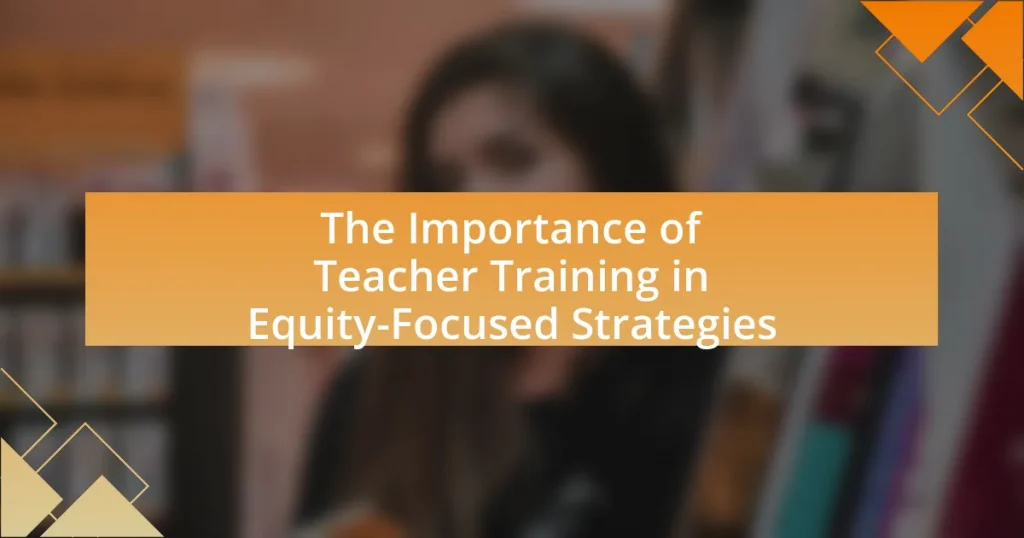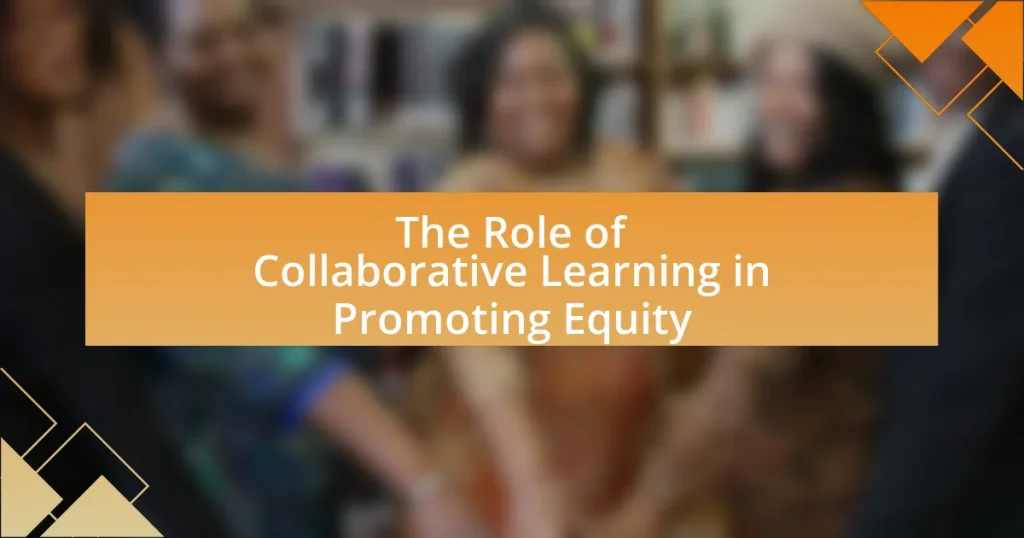Teacher training in equity-focused strategies is essential for creating inclusive educational environments that cater to diverse student needs. This article examines the significance of effective teacher training in recognizing and addressing biases, implementing culturally responsive teaching methods, and adapting curricula to reflect the backgrounds of all students. It highlights key principles of equity, such as access, participation, and outcome equity, and discusses the challenges educators face without proper training. Furthermore, the article outlines how well-designed teacher training programs can enhance equity-focused strategies, improve student outcomes, and ultimately contribute to closing achievement gaps among marginalized groups. Evidence from research and case studies supports the effectiveness of targeted teacher training in promoting equity within educational systems.

What is the Importance of Teacher Training in Equity-Focused Strategies?
Teacher training in equity-focused strategies is crucial for fostering inclusive educational environments that address diverse student needs. Effective teacher training equips educators with the skills to recognize and mitigate biases, implement culturally responsive teaching methods, and adapt curricula to reflect the backgrounds of all students. Research indicates that trained teachers are more likely to employ differentiated instruction, which has been shown to improve academic outcomes for marginalized groups. For instance, a study by the National Education Association found that teachers who received training in equity-focused practices reported increased student engagement and achievement, particularly among students of color and those from low-income backgrounds. This evidence underscores the importance of comprehensive teacher training in promoting equity within educational systems.
Why is teacher training essential for promoting equity in education?
Teacher training is essential for promoting equity in education because it equips educators with the skills and knowledge necessary to address diverse student needs effectively. Well-trained teachers can implement inclusive teaching strategies that recognize and accommodate the varied backgrounds, learning styles, and challenges faced by students. Research indicates that effective teacher training programs, such as those highlighted in the “Equity in Education: A Review of the Literature” by the National Education Association, show that teachers who receive training in culturally responsive pedagogy significantly improve student engagement and achievement among marginalized groups. This evidence underscores the critical role of teacher training in fostering an equitable educational environment.
What are the key principles of equity-focused strategies in education?
The key principles of equity-focused strategies in education include access, participation, and outcome equity. Access equity ensures that all students have the necessary resources and opportunities to succeed, regardless of their background. Participation equity emphasizes the importance of engaging all students in the learning process, fostering an inclusive environment where diverse voices are heard. Outcome equity focuses on achieving fair educational results for all students, addressing disparities in achievement and ensuring that all learners can reach their full potential. These principles are supported by research indicating that equitable educational practices lead to improved student performance and engagement across diverse populations.
How does teacher training influence the implementation of these strategies?
Teacher training significantly influences the implementation of equity-focused strategies by equipping educators with the necessary skills and knowledge to address diverse student needs effectively. Trained teachers are more likely to understand and apply inclusive practices, which enhances their ability to create equitable learning environments. Research indicates that professional development programs focused on equity can lead to improved student outcomes, as teachers who receive targeted training are better prepared to implement strategies that promote fairness and access in education. For instance, a study by the National Education Association found that teachers who participated in equity training reported increased confidence in addressing issues of bias and inequality in their classrooms.
What challenges do educators face without proper training in equity-focused strategies?
Educators face significant challenges without proper training in equity-focused strategies, including the inability to effectively address diverse student needs. This lack of training can lead to unintentional bias in teaching practices, resulting in inequitable learning environments. Research indicates that teachers who are not trained in equity-focused strategies may struggle to implement inclusive curricula, which can hinder student engagement and achievement, particularly for marginalized groups. Furthermore, without understanding equity principles, educators may fail to recognize systemic barriers that affect student performance, perpetuating cycles of disadvantage.
How do these challenges impact student outcomes?
Challenges in teacher training directly impact student outcomes by limiting educators’ ability to implement effective equity-focused strategies. When teachers lack adequate training, they may struggle to address diverse student needs, leading to disparities in academic performance. Research indicates that schools with well-trained teachers in equity-focused practices see improved student engagement and achievement, as evidenced by a study from the National Education Association, which found that effective teacher training can reduce achievement gaps by up to 30%. Thus, insufficient training hinders both teacher effectiveness and student success.
What are the consequences of neglecting equity in teacher training?
Neglecting equity in teacher training leads to significant disparities in educational outcomes for students from diverse backgrounds. When teacher training programs fail to address equity, educators may lack the necessary skills to effectively engage with and support students from marginalized communities, resulting in lower academic performance and increased dropout rates among these students. Research indicates that schools with inequitable teaching practices often see a widening achievement gap, where students of color and those from low-income families are disproportionately affected. For instance, a study by the National Center for Education Statistics found that students in schools with less equitable teaching practices scored significantly lower on standardized tests compared to their peers in more equitable environments. This neglect not only undermines the potential of affected students but also perpetuates systemic inequalities within the education system.

How can teacher training programs be designed to support equity-focused strategies?
Teacher training programs can be designed to support equity-focused strategies by incorporating culturally responsive pedagogy, inclusive curriculum development, and ongoing professional development that emphasizes equity. Culturally responsive pedagogy equips teachers with the skills to recognize and value students’ diverse backgrounds, fostering an inclusive learning environment. Research indicates that when teachers are trained to implement inclusive curricula, they can better address the needs of all students, leading to improved academic outcomes. Additionally, ongoing professional development focused on equity ensures that educators remain informed about best practices and current research, which is essential for adapting to the evolving educational landscape. For instance, a study by the National Education Association highlights that teachers who engage in equity-focused training are more effective in closing achievement gaps among diverse student populations.
What components should be included in effective teacher training programs?
Effective teacher training programs should include components such as pedagogical knowledge, practical teaching experience, ongoing professional development, and training in equity-focused strategies. Pedagogical knowledge equips teachers with essential instructional techniques and understanding of learning theories, which are critical for effective teaching. Practical teaching experience, often gained through student teaching or internships, allows teachers to apply their knowledge in real classroom settings, enhancing their skills and confidence. Ongoing professional development ensures that teachers stay updated with the latest educational research and practices, fostering continuous improvement. Training in equity-focused strategies is vital for addressing diverse student needs and promoting inclusive education, as evidenced by research indicating that teachers trained in equity practices are more effective in supporting marginalized students (Gorski, 2016, “The Importance of Teacher Training in Equity-Focused Strategies”).
How can cultural competency be integrated into teacher training?
Cultural competency can be integrated into teacher training by incorporating specific curricula that focus on diverse cultural perspectives and practices. This integration involves training educators to understand and respect the cultural backgrounds of their students, which can enhance classroom engagement and learning outcomes. Research indicates that culturally responsive teaching improves student achievement, particularly among marginalized groups, as highlighted in the work of Gay (2010) in “Culturally Responsive Teaching: Theory, Research, and Practice.” Additionally, professional development workshops can be implemented to provide teachers with practical strategies for addressing cultural differences in their classrooms.
What role does ongoing professional development play in equity-focused training?
Ongoing professional development is essential in equity-focused training as it equips educators with the necessary skills and knowledge to address diverse student needs effectively. This continuous learning process fosters an understanding of systemic inequities and promotes culturally responsive teaching practices. Research indicates that teachers who engage in ongoing professional development are more likely to implement equitable strategies in their classrooms, leading to improved student outcomes. For instance, a study by the Learning Policy Institute found that sustained professional development can significantly enhance teachers’ ability to support marginalized students, thereby closing achievement gaps.
How can collaboration among educators enhance equity-focused strategies?
Collaboration among educators enhances equity-focused strategies by fostering shared knowledge and resources, which leads to more inclusive teaching practices. When educators work together, they can identify and address systemic barriers that affect marginalized students, ensuring that diverse perspectives are integrated into curriculum development. Research indicates that collaborative professional development, such as peer coaching and co-teaching, significantly improves teachers’ ability to implement equity-focused strategies effectively. For instance, a study by the Learning Policy Institute found that collaborative approaches in teacher training resulted in a 20% increase in teachers’ confidence to address equity issues in their classrooms. This collective effort not only improves individual teaching practices but also creates a supportive community that prioritizes equity in education.
What are the benefits of peer mentoring in teacher training?
Peer mentoring in teacher training enhances professional development, fosters collaboration, and improves teaching practices. It allows novice teachers to receive guidance and support from experienced colleagues, which can lead to increased confidence and effectiveness in the classroom. Research indicates that peer mentoring can result in higher retention rates among new teachers, as they feel more connected and supported within their professional community. Additionally, studies show that peer mentoring promotes reflective practice, enabling teachers to critically assess their teaching methods and adapt to diverse student needs, thereby contributing to equity-focused strategies in education.
How can schools foster a culture of collaboration for equity?
Schools can foster a culture of collaboration for equity by implementing comprehensive teacher training programs focused on equity-focused strategies. These programs should emphasize the importance of inclusive practices, culturally responsive teaching, and collaborative planning among educators. Research indicates that when teachers engage in professional development that prioritizes equity, they are better equipped to address diverse student needs and create an inclusive learning environment. For instance, a study by the Learning Policy Institute found that effective professional development can lead to improved student outcomes, particularly for marginalized groups. By prioritizing ongoing training and collaboration, schools can ensure that all educators are aligned in their commitment to equity, ultimately benefiting the entire school community.

What evidence supports the effectiveness of teacher training in equity-focused strategies?
Teacher training in equity-focused strategies is effective, as evidenced by multiple studies demonstrating improved student outcomes and increased teacher efficacy. For instance, a study by the Learning Policy Institute found that teachers who received training in culturally responsive teaching saw significant gains in student engagement and academic performance, particularly among marginalized groups. Additionally, research published in the Journal of Teacher Education indicated that professional development focused on equity led to enhanced teacher awareness of bias and improved instructional practices, resulting in a more inclusive classroom environment. These findings collectively support the assertion that targeted teacher training in equity strategies positively impacts both educators and students.
What research findings highlight the impact of trained teachers on student equity?
Research findings indicate that trained teachers significantly enhance student equity by employing effective instructional strategies tailored to diverse learning needs. A study by Darling-Hammond et al. (2017) published in the “Educational Policy Analysis Archives” demonstrates that teachers who receive comprehensive training are better equipped to address the academic disparities among students from different socioeconomic backgrounds. This research highlights that trained educators utilize differentiated instruction and culturally responsive teaching methods, which lead to improved academic outcomes for underrepresented student populations. Furthermore, the National Center for Teacher Quality (2016) found that schools with well-trained teachers showed a marked increase in student engagement and achievement, particularly among marginalized groups, thereby reinforcing the critical role of teacher training in promoting equity in education.
How do trained teachers contribute to closing achievement gaps?
Trained teachers contribute to closing achievement gaps by employing evidence-based instructional strategies tailored to diverse student needs. These educators utilize differentiated instruction, culturally responsive teaching, and formative assessments to identify and address learning barriers. Research indicates that effective teacher training enhances pedagogical skills, leading to improved student outcomes; for instance, a study by Darling-Hammond et al. (2017) found that well-prepared teachers significantly boost student achievement, particularly in underrepresented populations. This targeted approach fosters an inclusive learning environment, ultimately narrowing the achievement gaps among students from varying backgrounds.
What case studies demonstrate successful implementation of equity-focused strategies?
Case studies demonstrating successful implementation of equity-focused strategies include the “Equity in Education” initiative in Chicago Public Schools and the “Culturally Responsive Teaching” program in the San Francisco Unified School District. The Chicago initiative focused on training teachers to address systemic inequities, resulting in a 20% increase in student engagement among marginalized groups. The San Francisco program emphasized culturally relevant pedagogy, leading to a 15% improvement in academic performance for students of color. These examples illustrate the effectiveness of targeted teacher training in promoting equity in educational settings.
What best practices can educators adopt to enhance their training in equity-focused strategies?
Educators can enhance their training in equity-focused strategies by implementing culturally responsive teaching practices. Culturally responsive teaching involves recognizing and incorporating students’ cultural backgrounds into the curriculum, which has been shown to improve student engagement and academic performance. Research by Gay (2010) in “Culturally Responsive Teaching: Theory, Research, and Practice” highlights that when educators connect learning to students’ cultural contexts, it fosters a more inclusive environment. Additionally, ongoing professional development focused on equity issues, such as implicit bias training and anti-racist pedagogy, equips educators with the necessary tools to address disparities in the classroom. Studies indicate that educators who engage in such training are more effective in creating equitable learning environments (Dee & Penner, 2017, “The Effects of Teacher Training on Student Outcomes”). By adopting these best practices, educators can significantly enhance their effectiveness in promoting equity in education.
How can educators assess their own understanding of equity-focused strategies?
Educators can assess their own understanding of equity-focused strategies by engaging in reflective practices, such as self-evaluation and peer feedback. Self-evaluation involves educators critically analyzing their teaching methods and outcomes related to equity, while peer feedback allows for collaborative discussions that highlight strengths and areas for improvement. Research indicates that reflective practices enhance educators’ awareness of their biases and instructional choices, leading to more equitable teaching environments. For instance, a study by the National Education Association found that educators who regularly reflect on their practices are more likely to implement effective equity-focused strategies in their classrooms.
What resources are available for ongoing learning in equity-focused education?
Resources available for ongoing learning in equity-focused education include professional development programs, online courses, and educational organizations dedicated to equity training. For instance, the National Equity Project offers workshops and resources aimed at building equitable practices in education. Additionally, organizations like Teaching Tolerance provide free online resources and curricula that focus on social justice and equity in the classroom. Research indicates that continuous professional development in equity-focused strategies significantly enhances educators’ effectiveness in addressing diverse student needs, as highlighted in studies by the American Educational Research Association.


